Table of Contents
1. Physical Health
Physical health refers to the overall well-being of the body. It encompasses factors such as fitness, nutrition, and disease prevention.
2. Mental Health
Mental health relates to our cognitive and emotional well-being. It involves how we think, feel, and cope with daily life. Maintaining good mental health is crucial for overall wellness.
Physical Dimension
The physical dimension of health refers to the well-being of our body. Mental health plays a significant role in this dimension as it directly affects our physical well-being. A sound mind is essential for overall physical health and vice versa. Therefore, mental health, which involves emotional well-being, cognitive abilities, and psychological state, is an integral part of the physical dimension of health.
Social Dimension
The social dimension of health encompasses our relationships, interactions, and connections with others. Mental health plays a crucial role in our social well-being. Positive mental health allows individuals to form meaningful relationships, communicate effectively, and maintain a support system. It also helps in dealing with conflicts, stress, and emotional challenges in interpersonal connections, thus contributing to overall social health.
Emotional Dimension
The emotional dimension of health revolves around our ability to manage and express our feelings appropriately. Mental health plays a central role in this dimension, as it affects our emotional well-being and stability. It involves understanding and managing emotions, coping with stress, developing resilience, and maintaining a positive mindset. Optimal mental health supports emotional balance and contributes to a healthy emotional dimension of health.
Intellectual Dimension
The intellectual dimension of health involves the capacity to think critically, solve problems, and continuously learn and grow. Mental health significantly influences this dimension as it affects our cognitive abilities, concentration, memory, and overall brain functioning. Good mental health enhances intellectual growth, creativity, and the ability to adapt to new situations, thus contributing to an optimal intellectual dimension of health.
Spiritual Dimension
The spiritual dimension of health refers to our sense of purpose, beliefs, values, and connection to something greater than ourselves. Mental health plays a significant role in this dimension as it influences our inner peace, self-awareness, and alignment with our values and beliefs. A healthy mind promotes spiritual well-being by fostering a positive outlook, providing inner strength, and allowing individuals to find meaning and purpose in their lives.
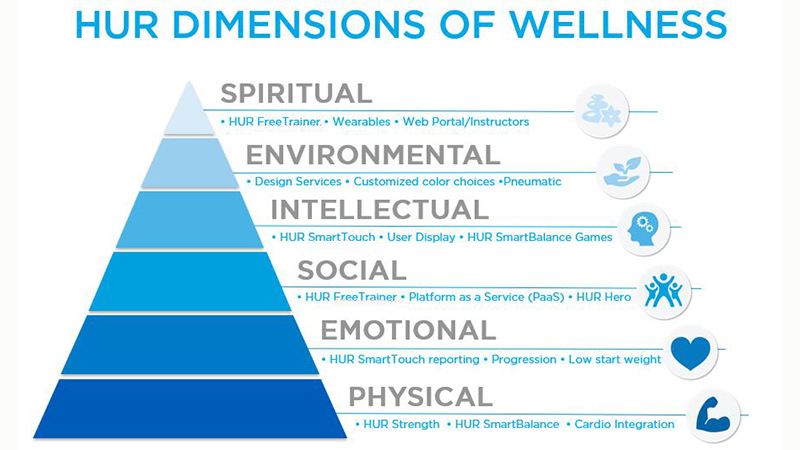
3. Emotional Health
Emotional health focuses on understanding and managing our emotions effectively. It involves recognizing and expressing emotions in a balanced way to enhance overall emotional well-being.
Emotional health is a crucial aspect of overall well-being that falls under the broader concept of health. It pertains to an individual's ability to understand, manage, and express their emotions in a healthy and balanced manner.
The 5 Dimensions of Health Definitions
1. Physical Health:
Physical health refers to the well-being of the body, encompassing factors such as fitness, nutrition, and lifestyle choices. It plays a significant role in emotional health as physical activity and proper nutrition contribute to better mood, stress reduction, and overall emotional stability.
2. Mental Health:
Mental health refers to an individual's cognitive and psychological well-being. It includes the ability to cope with stress, handle emotions effectively, and maintain a positive mindset. Good mental health directly impacts emotional health, allowing individuals to handle daily challenges and maintain healthy relationships.
3. Social Health:
Social health focuses on an individual's ability to form and maintain healthy relationships, connect with others, and participate in a supportive community. Strong social connections provide emotional support, reduce feelings of loneliness, and contribute to overall happiness and well-being.
4. Intellectual Health:
Intellectual health involves continuous learning, curiosity, and mental stimulation. It encompasses critical thinking, problem-solving skills, and the ability to adapt to new situations. By challenging oneself intellectually, individuals can improve their emotional well-being, boost self-confidence, and enhance their overall quality of life.
5. Spiritual Health:
Spiritual health refers to an individual's search for meaning, purpose, and connection with something greater than oneself. It encompasses beliefs, values, and ethics. Developing spiritual health can lead to inner peace, emotional resilience, and a sense of belonging, providing a strong foundation for overall emotional well-being.
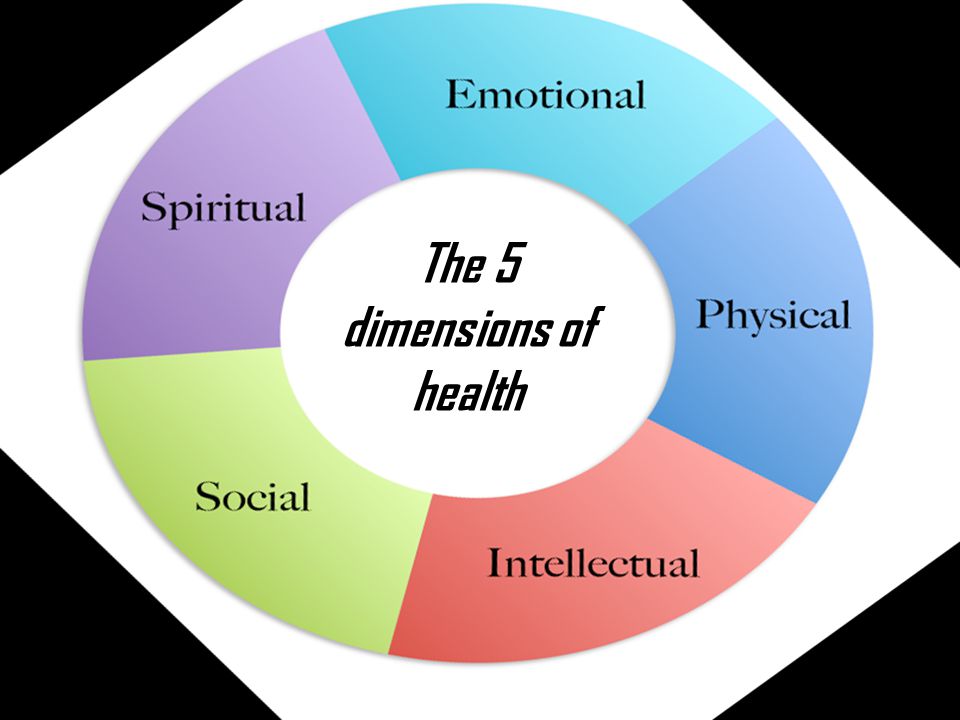
4. Social Health
Social health involves the quality of our relationships and interactions with others. It encompasses building healthy connections, maintaining supportive networks, and fostering a sense of belonging in a community.
Social health is an essential aspect of overall well-being and is one of the five dimensions of health definitions. It refers to the ability to establish and maintain positive relationships with others, including family, friends, and community members.
A person with good social health enjoys healthy interactions, experiences a sense of belonging, and is capable of forming meaningful connections with others. Social health plays a crucial role in emotional and mental well-being as it provides support systems and fosters a sense of social connectedness and inclusion.
Some key elements of social health include effective communication skills, empathy, active listening, respect for others' boundaries, and the ability to collaborate and cooperate with different individuals and groups.
People with strong social health often experience higher levels of happiness, lower stress levels, and improved self-esteem. They also have access to a broader network of resources, social support, and opportunities for personal growth.
Overall, social health is integral to leading a balanced and fulfilling life. Nurturing positive relationships and engaging in social activities contribute significantly to one's overall well-being and happiness.
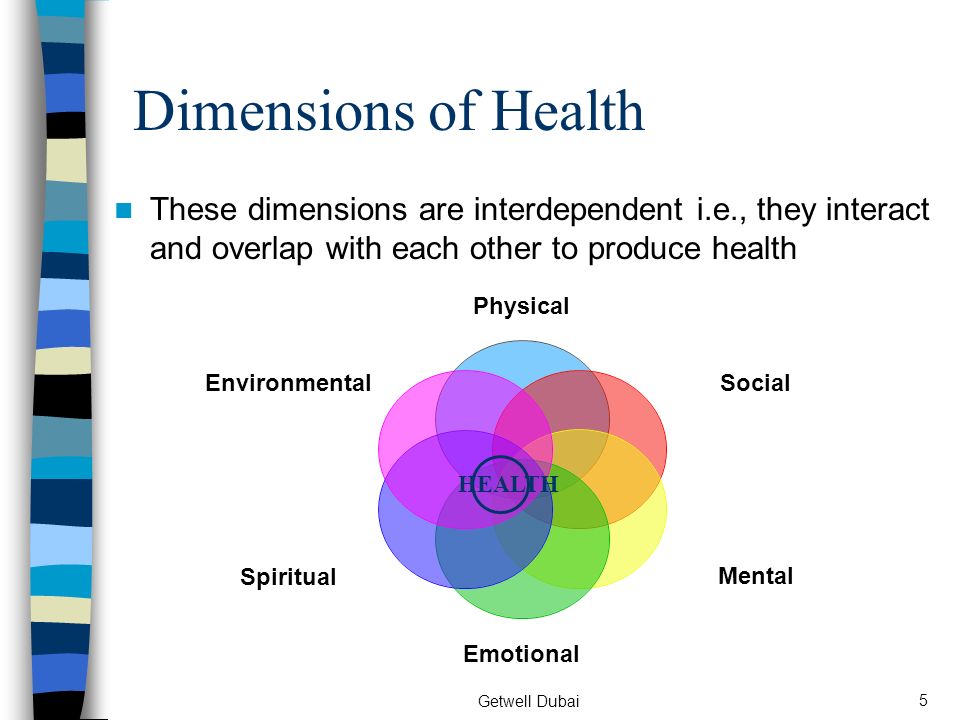
5. Spiritual Health
Spiritual health pertains to finding meaning and purpose in life. It involves the development of personal beliefs, values, and ethics that guide one's actions and contribute to overall well-being.
Definition:
Spiritual health refers to the overall well-being of an individual's inner self and their connection with a higher power, personal beliefs, values, and purpose in life.
Dimensions of Spiritual Health:
When discussing spiritual health, it is often categorized into five dimensions:
- Beliefs: This dimension emphasizes an individual's religious or philosophical beliefs. It involves understanding and aligning one's values with a higher power or spiritual entity.
- Values: Values shape an individual's behavior and guide their decision-making process. This dimension emphasizes living in alignment with one's personal values and principles.
- Purpose: This dimension focuses on discovering and pursuing a sense of meaning and purpose in life. It involves identifying personal goals and contributing to something larger than oneself.
- Connectedness: Spiritual health highlights the importance of developing and nurturing connections with others, as well as with nature and the environment. It involves fostering meaningful relationships and finding harmony in the interconnectedness of all things.
- Mindfulness: Mindfulness refers to being fully present in the current moment and practicing self-awareness. This dimension involves developing techniques such as meditation, reflection, and gratitude to enhance spiritual well-being.
Importance of Spiritual Health:
Spiritual health is a vital aspect of overall well-being as it provides individuals with a sense of purpose, inner peace, and emotional resilience. It can help navigate life's challenges, cope with stress, and promote a sense of fulfillment.
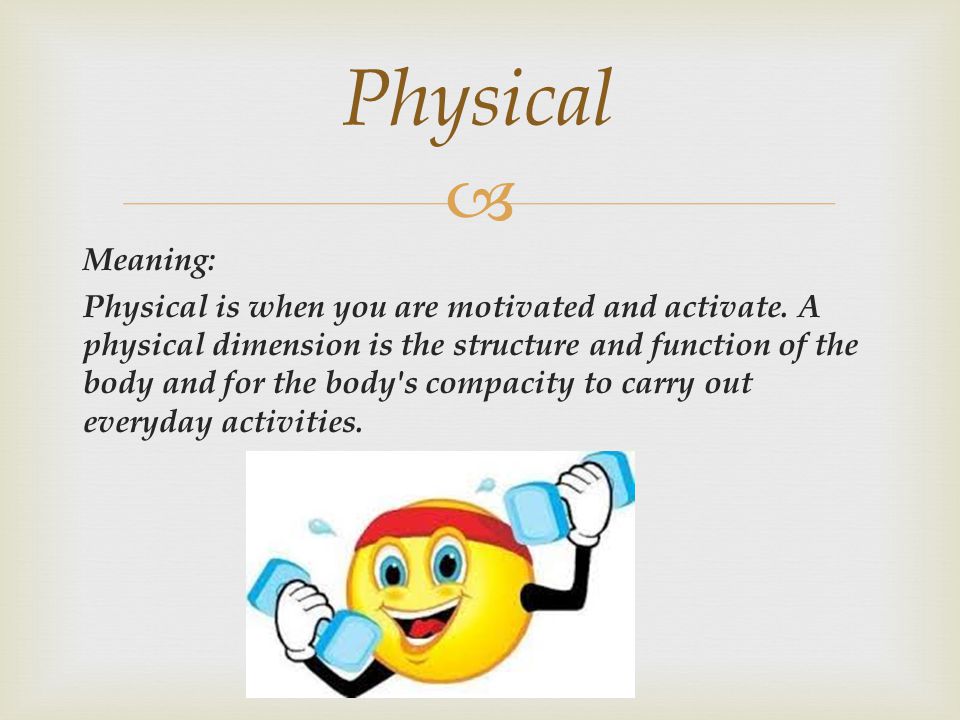
Key Takeaways
- Physical health focuses on the body and its well-being.
- Mental health relates to cognitive and emotional well-being.
- Emotional health involves understanding and managing emotions effectively.
- Social health encompasses healthy relationships and interactions.
- Spiritual health relates to finding meaning and purpose in life.
FAQ
- Q: How can I improve my physical health?
- A: You can improve physical health by engaging in regular exercise, maintaining a balanced diet, and getting enough sleep.
- Q: What are some ways to enhance mental health?
- A: Taking care of your mental health involves practicing self-care, seeking support from loved ones or professionals, and engaging in activities that bring you joy.
- Q: How can social connections impact overall well-being?
- A: Strong social connections provide emotional support, reduce stress, and promote a sense of belonging, all of which contribute to better overall well-being.
- Q: What role does spirituality play in health?
- A: Spirituality can provide a sense of purpose and meaning in life, which has been linked to improved mental, emotional, and even physical health outcomes.
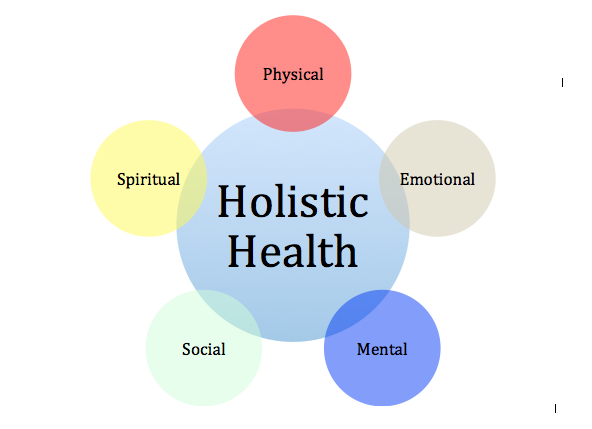


Recent Comments